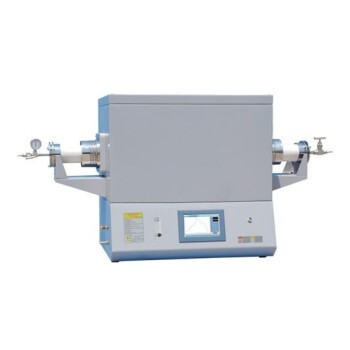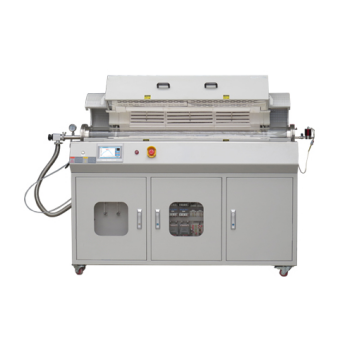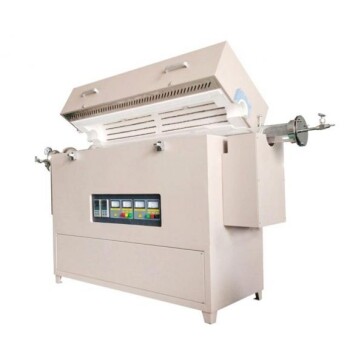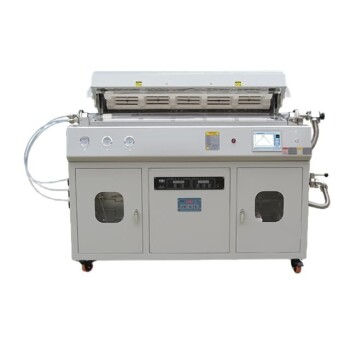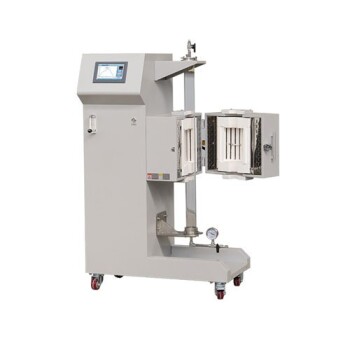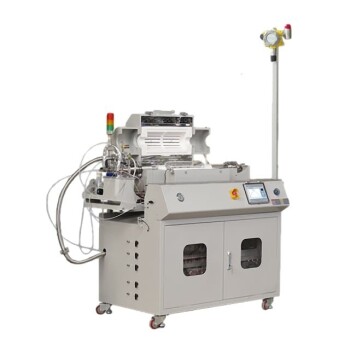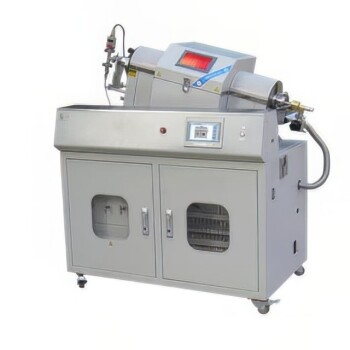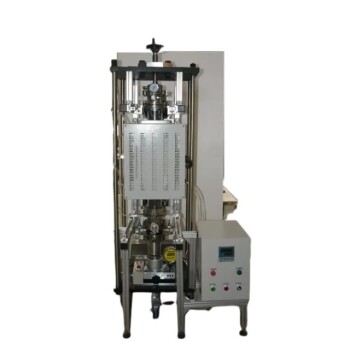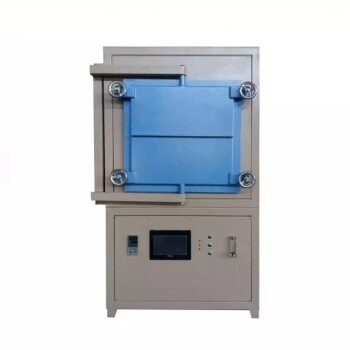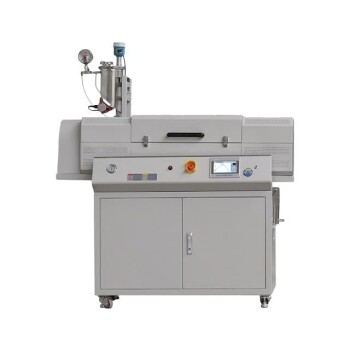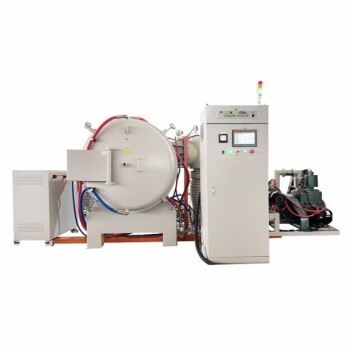At its core, uniform temperature distribution in a tube furnace is the single most critical factor for achieving reliable, repeatable, and high-quality results. Without it, any process, from advanced material synthesis to simple heat treatment, is compromised because different parts of your sample are undergoing fundamentally different thermal processes, invalidating the outcome.
The central issue is not just about heating a sample, but about controlling its transformation. Temperature non-uniformity introduces uncontrolled variables at the microscopic level, directly corrupting a material's final crystal structure, composition, and physical properties, rendering results unpredictable.
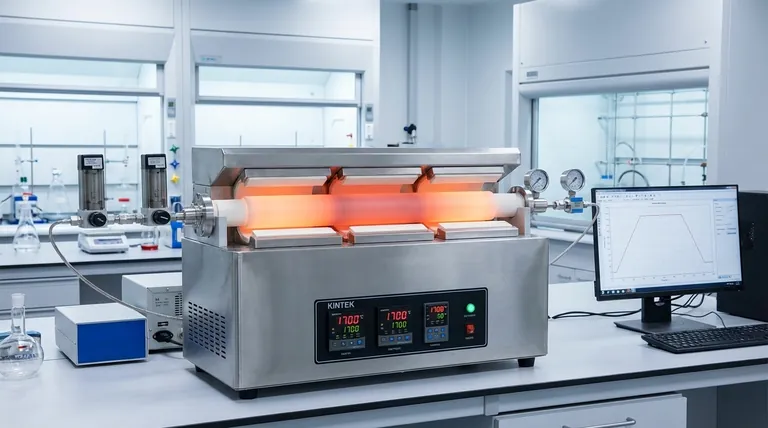
The Principle: Why Uniform Heat Governs Material Properties
Temperature as a Tool for Microstructure Control
Heat treatment is not a blunt instrument; it is a precise tool for manipulating a material's internal structure. Processes like annealing, sintering, or crystal growth rely on specific temperatures to rearrange atoms, grow grains, or initiate chemical reactions.
This control allows you to directly influence the final properties of the material, including its strength, conductivity, and stability.
The Impact of Temperature Gradients
A temperature gradient is a variation in temperature across your sample. If one end of your sample is at 800°C while the other is at 780°C, they are not undergoing the same treatment.
This seemingly small difference means one part of the material may be forming the desired crystal phase while another is not. The result is a non-homogenous product with inconsistent and unpredictable properties.
Uniformity Is the Foundation of Reproducibility
In both scientific research and industrial production, reproducibility is paramount. You must be able to produce the same result every time you run a process.
Uniform temperature distribution ensures that the entire sample experiences the exact intended thermal conditions. This eliminates a major source of variation, making your results consistent and trustworthy from one run to the next.
How Tube Furnaces Create a Uniform Thermal Zone
Multi-Zone Heating Systems
The most effective method for achieving uniformity is through multi-zone heating. A standard furnace may have one heating zone, but more advanced models use three or more.
Each zone has its own thermocouple and controller. By setting the outer zones to a slightly higher temperature, you can compensate for heat loss at the ends of the tube, creating a much longer and more stable central zone of uniform temperature.
The Role of Insulation Plugs
Heat naturally escapes from the open ends of the furnace tube. This is a primary cause of temperature drop-off and a shortened uniform zone.
Insulation plugs, typically made of ceramic fiber, are placed inside the tube at both ends of the sample area. They act as thermal barriers, drastically reducing heat loss and helping to extend the length of the uniform temperature zone.
Defining the "Uniform Length"
No furnace is perfectly uniform across its entire length. Manufacturers specify a "uniform length" or "work zone," which is the region in the center of the furnace that maintains a specific temperature tolerance.
A common industry standard for this tolerance is ±5°C, though high-precision applications may require an even tighter specification like ±1°C. Knowing your furnace's specified uniform length is critical for correct sample placement.
Understanding the Practical Trade-offs
Precision Comes at a Cost
A furnace with more heating zones, advanced controllers, and high-quality insulation provides superior uniformity. However, this increased complexity and performance comes with a higher initial equipment cost.
Process-Induced Non-Uniformity
Sometimes, the furnace itself is not the source of the problem. Factors related to your specific process can disrupt uniformity.
For example, introducing a constant flow of cool gas for a CVD process can create a persistent temperature gradient. This must be accounted for in your setup and temperature profiling.
Verification Is Non-Negotiable
Never assume your furnace's factory specifications hold true for your exact process. The only way to be certain of your thermal environment is to perform a temperature profile measurement.
This involves placing a calibrated thermocouple across the work zone to map the actual temperature your sample will experience, confirming the true location and length of your uniform zone.
Making the Right Choice for Your Goal
To ensure success, you must align your equipment and methods with your primary objective.
- If your primary focus is foundational research and development: Invest in a multi-zone furnace to gain the precise thermal control needed for exploring new materials and achieving reproducible data.
- If your primary focus is scaling up production: Prioritize a furnace with a clearly defined, stable, and sufficiently long uniform work zone to guarantee consistent product quality across every batch.
- If you are troubleshooting inconsistent results: Your first step should always be to perform a temperature profile measurement to verify the thermal conditions your sample is actually experiencing.
Ultimately, mastering the thermal environment within your furnace is the key to mastering your material outcomes.
Summary Table:
| Factor | Importance |
|---|---|
| Reproducibility | Ensures consistent results across experiments and production batches |
| Material Quality | Prevents defects and inconsistencies in crystal structure and properties |
| Process Control | Allows precise manipulation of microstructure for desired outcomes |
| Temperature Gradients | Avoids non-uniform heating that corrupts sample integrity |
Upgrade your lab's capabilities with KINTEK's advanced tube furnaces! Leveraging exceptional R&D and in-house manufacturing, we provide diverse laboratories with tailored high-temperature solutions, including Tube Furnaces, Muffle Furnaces, Rotary Furnaces, Vacuum & Atmosphere Furnaces, and CVD/PECVD Systems. Our strong deep customization capability ensures precise alignment with your unique experimental needs, delivering reliable, uniform heating for superior results. Contact us today to discuss how we can optimize your thermal processes and enhance your research or production efficiency!
Visual Guide

Related Products
- 1700℃ High Temperature Laboratory Tube Furnace with Quartz or Alumina Tube
- 1400℃ High Temperature Laboratory Tube Furnace with Quartz and Alumina Tube
- High Pressure Laboratory Vacuum Tube Furnace Quartz Tubular Furnace
- Laboratory Quartz Tube Furnace RTP Heating Tubular Furnace
- Split Multi Heating Zone Rotary Tube Furnace Rotating Tube Furnace
People Also Ask
- What safety and reliability features are incorporated into a vertical tube furnace? Ensuring Safe, Consistent High-Temp Processing
- Why is a tube furnace utilized for the heat treatment of S/C composite cathode materials? Optimize Battery Stability
- What recent improvements have been made to lab tube furnaces? Unlock Precision, Automation & Safety
- How do vertical tube furnaces comply with environmental standards? A Guide to Clean, Efficient Operation
- How is a high-temperature tube furnace utilized in the synthesis of MoO2/MWCNTs nanocomposites? Precision Guide
